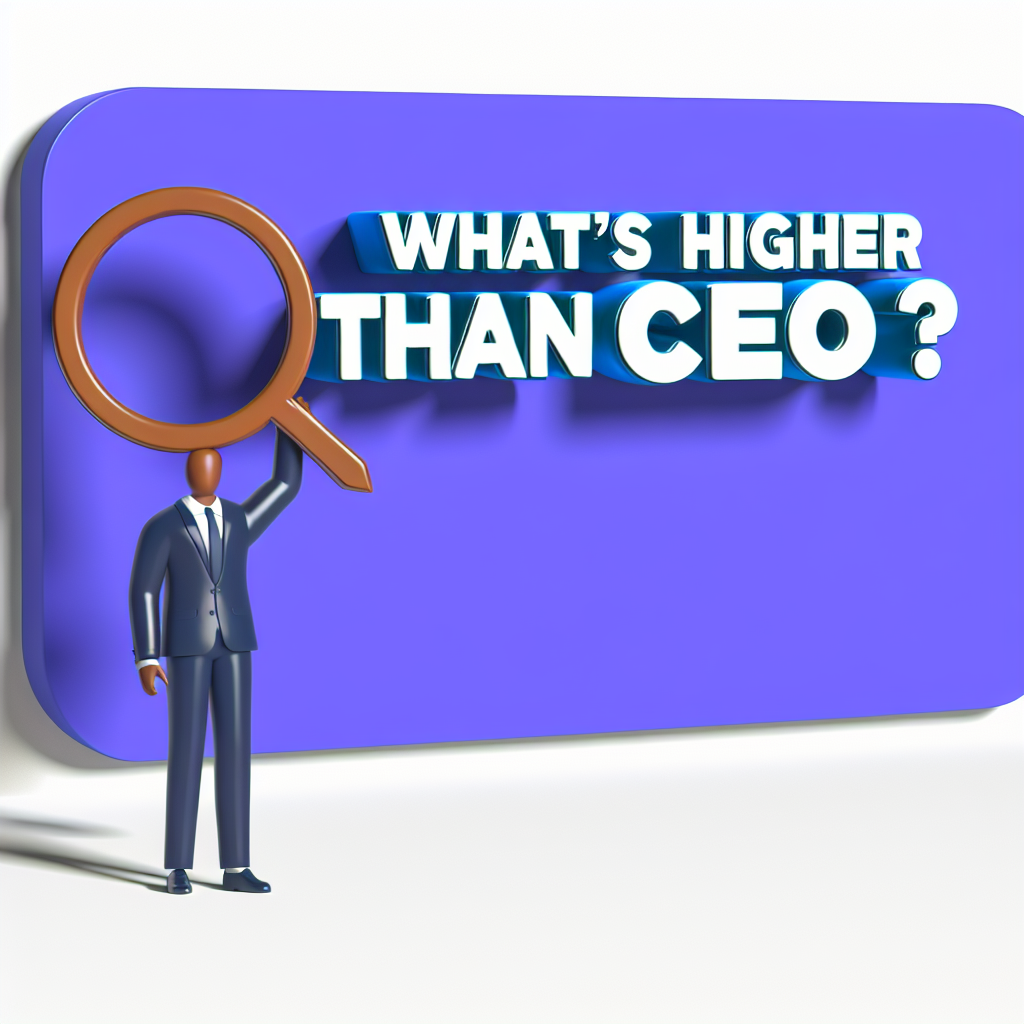
In the complex structure of an organisation, there exist various levels of leadership, and among these, the dynamic between the Chief Executive Officer (CEO) and the Chairman of the Board stands out as crucial to a company’s success. For professionals in Human Resources, understanding this relationship is essential not only for recruitment but also for structuring effective leadership within the organisation. This article delves into the intricacies of the roles of CEO and Chairman, shedding light on who holds the more powerful position, the significance of their functions, and current trends influencing these roles.
What’s Higher than CEO?
While the title of CEO is often synonymous with authority, the Chairman of the Board holds a position that is technically considered higher in the organisational hierarchy. The responsibilities that come with the Chairman’s role distinguish it significantly from that of the CEO. Below we explore key aspects that highlight the difference:
- Appointing and Evaluating: The Chairman possesses the power to appoint, evaluate, and even dismiss the CEO. This capacity ensures that leadership is aligned with the company’s goals and behaviours.
- Overseeing Strategy: The Chairman is instrumental in shaping and overseeing the overall strategy and direction of the company, often making crucial decisions that steer the organisation’s future.
- Legislative Oversight: In certain organisations, the Chairman possesses the authority to approve significant decisions, such as mergers and acquisitions, or vital policy changes, thus playing a critical role in corporate governance.
The Significance of the Chairman’s Role
The essentiality of the Chairman of the Board emerges from their ability to provide strategic guidance and oversight. This role acts as a cornerstone for ensuring that the organisation adheres to its mission and vision while holding the CEO accountable for their actions. The division of responsibilities allows for a balance of operational leadership (fulfilled by the CEO) and strategic direction (led by the Chairman).
Strategic Alignment
In a successful organisation, alignment between the Chairman and the CEO is paramount. The Chairman ensures that the board’s perspective aligns with the operational realities facing the organisation. The synergy here is crucial—the Chairman’s oversight can improve decision-making and, in turn, organisational performance.
Current Trends in Leadership Structures
The evolving landscape of corporate governance has led to heightened attention on the role of the Chairman. Many organisations now prioritise the appointment of experienced and knowledgeable individuals to this position. This change arises from the growing recognition of the need for effective governance, which is pivotal in today’s fast-paced business environment.
Importance of Experienced Leadership
As businesses grapple with challenges in the contemporary marketplace, having a seasoned Chairman can offer invaluable insights. Leaders with a wealth of experience bring with them a long-term perspective that can significantly influence a company’s strategic direction. This trend points towards a broader shift in corporate governance, where wisdom and seasoned judgement are increasingly prized. As such, HR professionals must take into account not just qualifications, but also experiential depth when selecting members for the board.
Key Benefits of Having a Chairman of the Board
The inclusion of a Chairman in the boardroom presents numerous advantages:
- Strategic Vision: The Chairman’s long-term focus helps ensure that immediate decisions are made with sustainability in mind.
- Independence: Serving often as an independent entity, the Chairman can offer an impartial assessment of the company’s performance and direction, which is vital for sound governance.
- Enhanced Governance: The dual leadership model fosters better checks and balances, securing accountability and enhancing the overall governance framework of the organisation.
Evaluating the Chairman-CEO Dynamic
The interaction between the Chairman and the CEO is critical to fostering an environment conducive to effective decision-making. To encourage this dynamic, both parties should engage in open communication, ensuring that strategic initiatives align with the company’s mission. It is advisable for HR professionals to facilitate this interaction when onboarding executives into their roles.
Periodic Evaluation
Regular assessments of both the Chairman’s and CEO’s performance can provide insights into their effectiveness and help identify areas for improvement. Implementing structured feedback mechanisms can promote healthy dialogue and ensure that leadership remains aligned with corporate objectives.
The Evolution of Corporate Governance
The push for transparency and adherence to ethical standards has transformed the corporate governance landscape over recent years. Companies now face greater scrutiny from stakeholders, necessitating a reevaluation of traditional governance structures. A competent Chairman can strengthen a company’s reputation and showcase a commitment to sound practices.
Consequences of Ineffective Leadership
Organisations lacking effective governance can find themselves on shaky ground. Poor decision-making, lack of accountability, and strategic misalignment often stem from an absence of clarity regarding leadership roles. HR professionals must advocate for robust governance frameworks that promote clarity, mutual respect, and defined responsibilities.
Conclusion
In conclusion, the role of the Chairman of the Board is indeed higher than that of the CEO, as indicated by their strategic oversight and ability to appoint and evaluate leadership. As the corporate landscape continues to evolve, so too will the dynamics of leadership within organisations. For HR professionals, recognising the value of the Chairman’s role is crucial in fostering effective governance and facilitating organisational success. The trends towards appointing experienced Chairmen further signify the importance of knowledgeable leaders in steering companies through the complexities of today’s business challenges.
For further insights into the significance of the Chairman in corporate governance, please visit the following sources:
Vadim Kouznetsov is a distinguished entrepreneur and the visionary founder and CEO of JobXDubai.com, the UAE’s rapidly expanding job board. Renowned for his expertise in bridging the gap between job seekers and employment opportunities, Vadim has become a leading authority in the recruitment and job market of Dubai.
